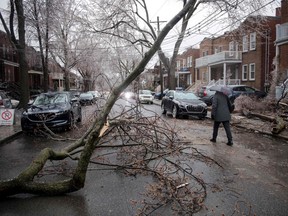Hydro-Québec says the main thing is to be prudent: you should not bring gas-powered equipment meant for the outdoors into your home.

Article content
Extreme weather can lead to downed power lines and planned interruptions to repair them, occasionally leaving Montrealers in the dark for extended periods of time.
That was the case in the spring of 2023, when an ice storm paralyzed the province. More than one million Quebecers were without power at its peak, nearly half of them on the island of Montreal.
The sheer magnitude of the damage to the network meant that some Hydro-Québec customers were in the dark for several days as crews worked to restore power.
Advertisement 2
Story continues below
Article content
About 9,500 Quebecers were still without power early Sunday evening after the remnants of tropical storm Debby dropped a record amount of rain on the Greater Montreal area, with an accumulation of 150 millimetres within 24 hours.
With the increase in extreme weather events as a result of climate change, Hydro-Québec has launched an adaptation plan to ensure the sustainability of its network, spokesperson Gabrielle Leblanc said.
But when extended outages do occur, there are a few things to keep in mind.
Here’s what you need to know
Hydro-Québec says the main thing to remember is to be prudent: you should not bring gas-powered equipment meant for the outdoors into your house — something the utility sees people do, Leblanc said.
“The usage indoors is dangerous; it presents a risk of asphyxiation and intoxication,” she said. “It can start fires as well.”
If it seems like the outage is widespread and going to last a while, temporary emergency shelters or drop-in centres may be set up for those affected (the main difference between the two being that shelters include dormitories).
Article content
Advertisement 3
Story continues below
Article content
“We often combine both actions, for example, during the ice storm … it wasn’t very warm, so we opened both,” said Sébastien Roy, head of Montreal’s civil security division.
That’s part of the city’s civil security plan, he explained.
“It will always depend on the context to know as of when we trigger (the plan) and mobilize, but if (the outage) happens, for example, during a period of extreme cold, we can trigger it more quickly,” Roy said.
To find out what services are available, you can call 311, or sign up in advance at montreal.ca/en/notices-and-alerts to receive notices and alerts from the city by text or email.
If Montreal’s civil security plan isn’t activated, it’s still possible the demerged cities or boroughs in question will set something up themselves.
“Given the fact that there’s something going on in their territory, (they) could put in place a centre, whether it’s a shelter or a multi-service help centre to help those citizens,” Roy said.
If you have to evacuate the house (most likely in the winter), there are some precautions the government of Canada suggests, such as: turning off your breaker; unplugging electronics; turning off the water main; and draining the water from your plumbing system. Hydro-Québec adds: turning off the circuit breaker for the water heater; pouring antifreeze into toilets and tanks; and if you heat with oil, making sure fuel isn’t pooling in the furnace.
Advertisement 4
Story continues below
Article content
Try to keep the fridge and freezer closed, as a full freezer can keep food frozen for 24 to 36 hours if not opened.
If it’s not cold out, there’s no danger in staying home during a prolonged outage, Leblanc said.
She suggested checking in on neighbours, friends and family.
“When … we know we have an aunt, an uncle, a parent, grandparent with an outage, it’s worth calling them, getting news, inviting them over if possible,” Leblanc said.
To be prepared to deal with emergency situations more generally, Roy and the government of Canada suggest having emergency plans in place. The latter suggests discussing them with the whole family — such as what to do if something happens while family members are at school or work. The government also suggests keeping important documents in watertight containers.
Every household should have an emergency kit of basic supplies with enough resources to be self-sufficient for a minimum of 72 hours.
“You may have some of the items already, such as a flashlight, battery-operated radio, food and water,” the government web page reads. “The key is to make sure they are organized and easy to find. Would you be able to find your flashlight in the dark?”
The kit should be kept in a bag that’s easy to carry and transport and is in an accessible place.
It should include:
- Water (at least two litres per person per day)
- Can opener
- Wind-up or battery-powered flashlight and radio, plus extra batteries
- First aid kit
- Any necessary medications, infant formula, important items for people with disabilities
- Extra keys to car and house
- Cash in smaller bills, change for pay phones
- Copy of emergency plan and contact information
- Candles, matches and/or lighter
Consult the government’s web page at getprepared.gc.ca for an extended list of emergency kit items.
Recommended from Editorial
Advertisement 5
Story continues below
Article content
Article content


Comments